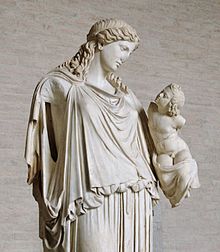Peace (Aristophanes)
| Peace | |
|---|---|

Eirene / Ploutos (Peace and Wealth): Roman copy of a work by Cephisodotus the Elder (c. 370 BC) that once stood on the Areopagus.
The Dramatis Personae in ancient comedy depends on interpretation of textual evidence. This list is developed from A. Sommerstein's translation. |
|
| Written by | Aristophanes |
| Chorus | 1.farmers 2.auxiliary chorus of citizens from various Greek states |
| Characters |
Silent roles
|
| Setting | outside a house in Athens and later in the heavens |
Silent roles
Peace (Greek: Εἰρήνη Eirēnē) is an Athenian Old Comedy written and produced by the Greek playwright Aristophanes. It won second prize at the City Dionysia where it was staged just a few days before the Peace of Nicias was validated (421 BC), which promised to end the ten-year-old Peloponnesian War. The play is notable for its joyous anticipation of peace and for its celebration of a return to an idyllic life in the countryside. However, it also sounds a note of caution, there is bitterness in the memory of lost opportunities and the ending is not happy for everyone. As in all of Aristophanes' plays, the jokes are numerous, the action is wildly absurd and the satire is savage. Cleon, the pro-war populist leader of Athens, is once again a target for the author's wit, even though he had died in battle just a few months earlier.
Short summary: Trygaeus, a middle-aged Athenian, miraculously brings about a peaceful end to the Peloponnesian War, thereby earning the gratitude of farmers while bankrupting various tradesmen who had profited from the hostilities. He celebrates his triumph by marrying Harvest, a companion of Festival and Peace, all of whom he has liberated from a celestial prison.
Detailed summary: Two slaves are frantically working outside an ordinary house in Athens, kneading unusually large lumps of dough and carrying them one by one into the stable. We soon learn from their banter that it is not dough but excrement gathered from various sources—they are feeding a giant dung beetle that their crazy master has brought home from the Mount Etna region and on which he intends flying to a private audience with the gods. This startling revelation is confirmed moments later by the sudden appearance of Trygaeus on the back of the dung beetle, rising above the house and hovering in an alarmingly unsteady manner. His two slaves, his neighbours and his children take fright and they plead with him to come back down to earth. He steadies the spirited beetle, he shouts comforting words to his children and he appeals to the audience not to distract his mount by farting or shitting any time in the next three days. His mission, he declares, is to reason with the gods about the war or, if they will not listen, he will prosecute the gods for treason against Greece. Then he soars across the stage heavenwards.
...
Wikipedia
